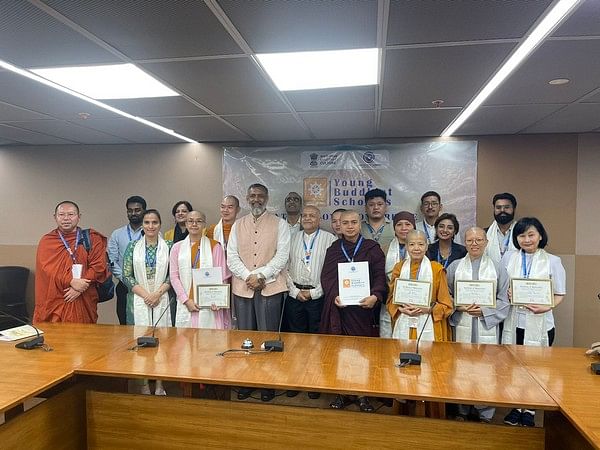New Delhi [India], August 2 (ANI): The international conference of young Buddhist scholars on ‘Significance of Buddhist Pilgrimage’ brought together young academicians and researchers who discussed diverse dimensions of Buddhist pilgrimage as seen by the youth today.
The Conference held in New Delhi was organised by the International Buddhist Confederation (IBC), under the aegis of the Ministry of Culture.

The primary objective of the conference was to create a vibrant platform for young researchers to share their insights, engage in scholarly pursuit, and contribute to the advancement of knowledge in the field. It will inspire the next generation to further engagement with the 8 Buddhist sites in India and carry out research on other sites here and overseas.
The conference witnessed an impressive attendance of more than 70 young scholars of different nationalities representing various Buddhist institutions. Academicians and researchers from around the world explored the profound dimensions of Buddhist pilgrimage and shared their valuable insights.

“Taking pilgrimage to holy sites has two aspects. The first one is physical and the other is mental. According to the Buddha the mental aspect is an act of devotion and faith. By visiting these holy places and looking upon them with feelings of reverence and showing veneration, one is able to purify one’s thought, speech and action,” said a scholar.
Jigmet Olden, research scholar from Delhi University while speaking on ‘Historical Buddhist pilgrimage sites of Guru Padmasambhava in Ladhak’ said, “Pilgrimage is an essential part of Buddhism because it provides an opportunity for Buddhists to deepen their spiritual practise, connect with their faith, and cultivate mindfulness and compassion. It is also seen as a way to purify negative karma and gain merit or positive spiritual energy towards their path to eventual enlightenment.”

“Since time immemorial, Buddhists have traditionally performed an annual pilgrimage to the most significant Buddhist holy sites. These holy sites are revered as places of power and the physical manifestation of the Buddha’s teachings. By visiting these places, they believe they can absorb this spiritual energy and connect more deeply with the teachings of the Buddha. Among the many Buddhist pilgrimage sites, those associated with Guru Rinpoche (Padmasambhava) carry a unique significance,” he added.
The chief guest was SK Mishra, Chairman of the Indian Trust for Rural Heritage and Development (ITRHD). A keynote speech was delivered by Prof Kuldeep Chand Agnihotri, Vice Chairman of Sahitya and Sanskriti Akademi, Haryana, who provided profound insights into the importance of Buddhist pilgrimage and its impact on cultural heritage.
GKG Sarath Godakanda, Minister Counsellor from the Sri Lankan High Commission, New Delhi, as the Guest of Honour spoke on the significance of the conference and its relevance to the global Buddhist community. Other distinguished dignitaries present at the event included Tin Tin Htwe Win, Minister Counsellor (DCM) of the Embassy of the Republic of the Union of Myanmar and Keo Sengdavong, Deputy Chief of Mission of the Embassy of Laos.
The event generated an overwhelming response from young Buddhist scholars who seldom have a chance to be centre stage, that the Director General IBC, Abhijit Halder remarked that “seeing the motivation and enthusiasm, the IBC will be continuing with these conferences on many similar topics, engaging with the young scholars, in the coming months.”
Halder also highlighted the diverse walking trails related to Buddhism that IBC had embarked upon. The IBC had supported a Japanese group that took the holy walk from Dharamsala to Leh, over 100 Monks and nuns who walked from Bodhgaya to Sarnath and now organising the Mahaprajapati trail of nuns from Lumbini to Vaishali.
In a special lecture Ajmal Shah, Senior Assistant Professor of Archaeology, University of Kashmir spoke about the many excavations he had participated in, such as Farmana, Rakhigarhi in Haryana and Junnar in Maharashtra. He had been the director of the excavations at Ahan, a Kushan site on the sub-section of the ancient Silk Route in Kashmir Valley. He had also co-directed two international projects entitled “Archaeological Studies of migration routes from Central Asia to Kashmir”. (ANI)
This report is auto-generated from ANI news service. ThePrint holds no responsibility for its content.



